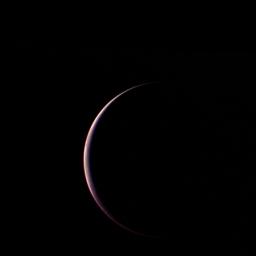
|
Voyager’s Parting Shot of Triton
- Click the image above for a larger view
- Full-Res JPEG (800 x 800) (14.2 kB)
- Full-Res TIFF (800 x 800) (322.2 kB)
Caption:
Voyager 2 obtained this parting shot of Triton, Neptune's largest satellite, shortly after closest approach to the moon and passage through its shadow on the morning of Aug. 25, 1989. The distance to Triton was 90,000 kilometers (56,000 thousand miles) and the phase angle was 155 degrees, so that only a thin crescent of Triton's south polar region can be seen. This image was assembled using the green, blue and violet filters of Voyager's wide angle camera. Because of the high phase angle, and perhaps because of scattering sunlight in Triton's hazy atmosphere, few surface features are discernible. Faint linear markings near the center of the crescent may be shadows case by surface features or by clouds, and the brightness of the left (western) horn of the crescent compared to the right horn may be a result of variable haze in the atmosphere.
Background Info:
The Voyager Mission is conducted by JPL for NASA's Office of Space Science and Applications.
Cataloging Keywords:
| Name | Value | Additional Values |
|---|---|---|
| Target | Triton | |
| System | Neptune | |
| Target Type | Satellite | |
| Mission | Voyager | |
| Instrument Host | Cassini Orbiter | Voyager 2 |
| Host Type | Orbiter | Flyby Spacecraft |
| Instrument | Imaging Science Subsystem (ISS) | |
| Detector | Wide Angle Camera | |
| Extra Keywords | Atmosphere, Color, Haze, Shadow, Visual | |
| Acquisition Date | ||
| Release Date | 2000-02-16 | |
| Date in Caption | 1989-08-25 | |
| Image Credit | NASA/JPL | |
| Source | photojournal.jpl.nasa.gov/catalog/PIA02247 | |
| Identifier | PIA02247 | |
